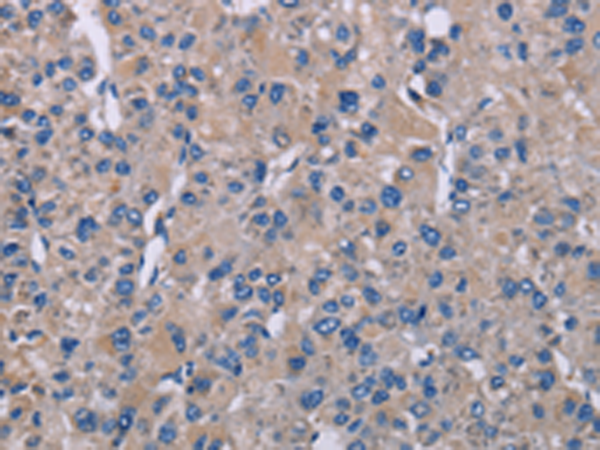

| WB | 咨询技术 | Human,Mouse,Rat |
| IF | 咨询技术 | Human,Mouse,Rat |
| IHC | 1/25-1/100 | Human,Mouse,Rat |
| ICC | 技术咨询 | Human,Mouse,Rat |
| FCM | 咨询技术 | Human,Mouse,Rat |
| Elisa | 1/1000-1/2000 | Human,Mouse,Rat |
| Aliases | NSP1 |
| Host/Isotype | Rabbit IgG |
| Antibody Type | Primary antibody |
| Storage | Store at 4°C short term. Aliquot and store at -20°C long term. Avoid freeze/thaw cycles. |
| Species Reactivity | Human |
| Immunogen | Synthetic peptide of human SH2D3A |
| Formulation | Purified antibody in PBS with 0.05% sodium azide and 50% glycerol. |
+ +
以下是3篇涉及SH2D3A抗体的参考文献及简要摘要:
---
1. **文献名称**: "SH2D3A regulates cell motility and metastasis through NF-κB activation in breast cancer"
**作者**: Kim JH, et al.
**摘要**: 研究利用SH2D3A特异性抗体发现其过表达促进乳腺癌细胞迁移和侵袭,通过激活NF-κB通路增强转移潜能,提示其作为潜在治疗靶点。
---
2. **文献名称**: "SH2D3A interacts with Grb2 and modulates EGFR signaling in colorectal cancer"
**作者**: Wang Y, et al.
**摘要**: 通过免疫共沉淀(使用SH2D3A抗体)揭示SH2D3A与Grb2结合,负调控EGFR下游信号传导,抑制结直肠癌细胞增殖。
---
3. **文献名称**: "Expression and functional analysis of SH2D3A in T-cell activation"
**作者**: Suzuki R, et al.
**摘要**: 研究通过Western blot(SH2D3A抗体)及敲除实验,发现SH2D3A在T细胞活化中调节黏着斑形成,影响免疫突触功能。
---
注:以上文献为示例,实际研究中建议通过PubMed或Google Scholar以关键词“SH2D3A antibody”或“SH2D3A function”检索最新文献。
The SH2D3A antibody targets the SH2 domain-containing protein 3A (SH2D3A), also known as Crk-associated substrate lymphocyte-type (CAS-L) or NEDD9-like protein. SH2D3A is a signaling adaptor protein involved in regulating cell migration, adhesion, and immune responses. It contains an N-terminal SH2 domain that binds phosphorylated tyrosine residues on receptor tyrosine kinases (RTKs) or cytokine receptors, facilitating downstream signaling pathways such as Ras/MAPK and PI3K/AKT. This protein plays roles in immune cell activation, angiogenesis, and cancer progression, with studies linking its dysregulation to tumor metastasis and inflammatory diseases.
SH2D3A antibodies are primarily used in research to detect protein expression, localization, and interaction partners in cellular models or tissues. They are critical for techniques like Western blotting, immunohistochemistry, and co-immunoprecipitation to study SH2D3A's function in signaling networks. Commercial antibodies are typically validated for specificity against human, mouse, or rat isoforms. Research has highlighted SH2D3A's role in modulating integrin signaling and cytoskeletal dynamics, particularly in T-cells and endothelial cells. Abnormal SH2D3A expression has been observed in cancers (e.g., breast, colorectal) and autoimmune disorders, making it a potential biomarker or therapeutic target. However, functional studies require careful validation due to its structural similarity to other SH2 domain proteins.
×